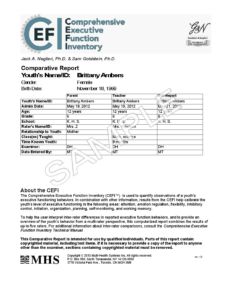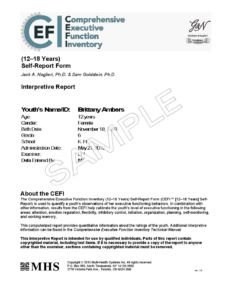
Comprehensive Executive Function Inventory [CEFI]
Evaluates executive function strengths and weaknesses in youth 5 to 18 years
Reading Level: 5 to 18 years
Format: Online (via MHS Online Assessment Center+)
Length: 15 minutes – parent completed, teacher completed, youth completed (12-18yr olds)
Scoring: Online
Authors: Jack A. Naglieri, Ph.D. and Sam Goldstein, PhD.
Printed Manuals
Physical printed manuals.
Online Forms, Reports, Kits & e-Manuals
All online resources including Forms, Reports, i-Admins, Kits and e-Manuals.
CEFI Manual
CEFI (12-18yrs) Self Online Report (each)
CEFI (5-18yrs) Parent Online Report (each)
CEFI (5-18yrs) Teacher Online Report (each)
The CEFI is a comprehensive evaluation of executive function strengths and weaknesses in youth aged 5 to 18 years.
The Purpose of the CEFI
The CEFI is a versatile instrument that can be used to evaluate an individual, using standard scores to compare the youth to a nationally representative norm group. This information can ultimately be used to guide assessment, diagnosis, and treatment planning. The CEFI is also useful in a variety of research contexts and can be used as an effective tool to evaluate the success of an intervention program.
How The CEFI Works
Authored by Jack. A. Naglieri, Ph.D., and Sam Goldstein, Ph.D., the CEFI is the most representative nationally standardised behaviour rating scale of executive function. Reliability and validity data indicate it has strong psychometric qualities. With 100 items on a Likert-type scale, 90 are distributed among the CEFI scales and 10 on the Positive and Negative Impression Scales. The CEFI offers Parent, Teacher, and Self (12 to 18 years) Reports, allowing for a multi-rater perspective of a youth’s executive function. The CEFI may be administered online, via email, or with paper through the MHS Online Assessment Center.
Following administration, all CEFI reports may be scored using the MHS QuikScore Format or MHS Online Assessment Center+. There are three types of reports that can be generated from all assessments: the Interpretive Report (provides detailed results from one administration), the Progress Monitoring and Treatment Effectiveness Report (provides an evaluation of CEFI score changes over time for up to four administrations from the same rater), and the Comparative report (provides an analysis of scores from two to five different raters).
Intended for use by professionals such as psychologists, school psychologists, clinical social workers, physicians, counsellors, psychiatric workers, and paediatric/psychiatric nurses, the CEFI is an effective and reliable tool for evaluating executive function.
The CEFI was developed to measure a wide spectrum of behaviours associated with executive function. In addition to a Full Scale score, calculated by adding responses to 90 of the items, the CEFI utilises nine scales to pinpoint targets for intervention.
Scales and Forms
The scales used in the CEFI have been developed to measure a wide spectrum of behaviours associated with executive functioning. The scores which emerge from these scales are based upon a nationally representative normative sample (aged 5 to 18 years) of a diverse group of individuals.
In addition to a Full Scale Score calculated by adding responses to 90 of the items, the CEFI utilises nine rationally-derived scales to pinpoint targets for intervention.
Scales
- Attention – measures how well a youth can avoid distractions, concentrate on tasks and sustain attention.
- Emotion Regulation – measures a youth’s control and management of emotions.
- Flexibility – describes how well a youth can adapt to circumstances, including problem solving ability.
- Inhibitory Control – reflects a youth’s control over behaviour or impulses.
- Initiation – describes a youth’s ability to begin tasks or projects without being prompted.
- Organization – describes how well a youth manages personal effects, work or multiple tasks.
- Planning – reflects how well a youth develops and implements strategies to accomplish tasks.
- Self-Monitoring – describes a youth’s self-evaluation of his/her performance or behaviour.
- Working Memory – measures how a youth keeps important information in mind in order that he/she know what to do and how to do it, including remembering important things, instructions and steps.
Online administration in MHS Assessment Center + (MAC+)
Assessing online has never been easier with the new MHS Online Assessment Center +. Experience the new online platform designed with clinicians for clinicians to ensure the easiest, fastest and most accurate assessing possible!
Why use the CEFI online?
- Save time – fast, easy and accurate administration with automated scoring
- Assess and score from anywhere – enjoy the convenience of viewing reports from your home, office or anywhere with an online connection
- Improve efficiency and accuracy – when items are absent, prompts appear to ensure information is not missed
- User friendly – easy to use interface for practitioners and respondents
- Gain information easily – email a link to the form directly to the respondent
- Tailored organisation – data can be customized to how you work
- Benefit from significant cost savings – don’t purchase paper forms in bulk ever again
View the full list of assessments available in the MHS Online Assessment Center + here.








